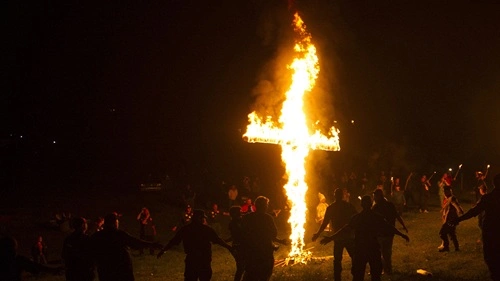See, the thing is, burning a cross in the United States is only illegal if it is specifically done to scare, threaten, or intimidate someone. Initially, the act of cross-burning was not American by nature. In fact, it has a history in old Scotland, where it was used by clans as a signalling device, a method to communicate in the case of war or other catastrophes. Nevertheless, the significance of the cross had changed drastically in the U.S. after this incident.
Since the beginning of the 20th century, the Ku Klux Klan was incorporating the burning cross into their repertoire of symbols used to frighten and intimidate its enemies, primarily Black people, but Jews, Catholics, and other people who were not considered “acceptable” by their limited definition of the term were also targeted. What they were conveying by the act was: terror.
And this is the reason the sign became so contentious. The display alone wasn’t what made it so sinister; it was also a frightening device by which those who used it intimidated the victims. Just picture how you would feel if you found a burning cross in your yard one morning. It is not an expression of your rights but a means to frighten you.

So, Is Cross Burning Considered Free Speech?
The situation becomes complex here. The First Amendment allows individuals to communicate their thoughts or ideas, even if their words or actions cause offense to others. Such expression also covers the hate, the unpopularity, and the strong disagreement with the speaker.
Burning a cross is, by its nature, symbolic expression. However, what makes it different is the purpose of the act.
If someone were to just light a cross on fire to merely show their viewpoint (even a hateful one) that could be safeguarded. However, the turning point is that if the act was done with the aim of frightening, persecuting, or harming a particular person or group, then it was changed into something that is not permissible. The act of terrorizing by threatening is what takes the right to free speech and converts it into illegal conduct.
What Has the Supreme Court Said?
Looking at two significant Supreme Court cases that have had a considerable influence on the present legal position regarding the matter might be helpful.
1. R.A.V. v. City of St. Paul (1992)
The case in question involves a teenager who set fire to a cross on the lawn of a Black family. The town was governed by a regulation that prohibited racially, religiously, or gender-wise hateful or frightening characters, which included those that could cause such emotions.
First of all, the law seemed just from the outside. Nevertheless, the Supreme Court demolished it. What was the reason? The law only prohibited particular kinds of hate speech, and those were not even banned. The Court decided that there was no point in differentiating laws based on the content of the message, even if that message were offensive. Hence, the crossfire was not among the prohibited acts by default, as in this instance.
2. Virginia v. Black (2003)
The case was about two different events. First, the KKK organized a demonstration and set fire to a cross on their land, which was theirs. Then, there was an incident where two individuals committed a hate crime by igniting a cross on the house of a Black family to shock them.


